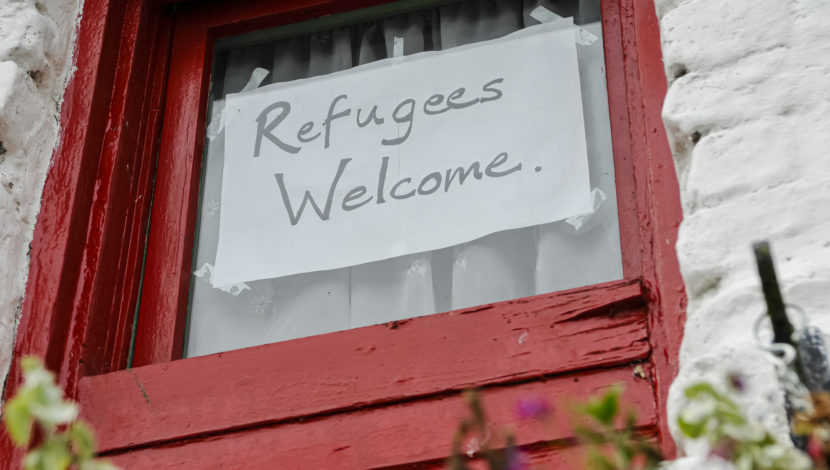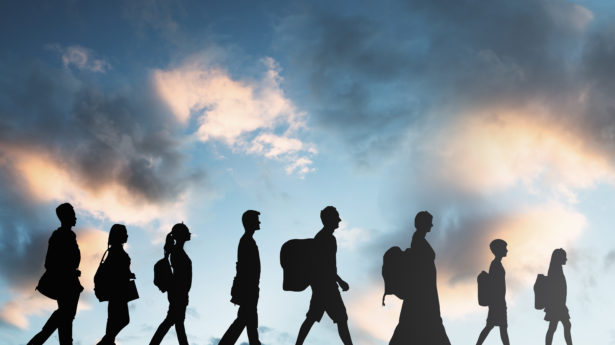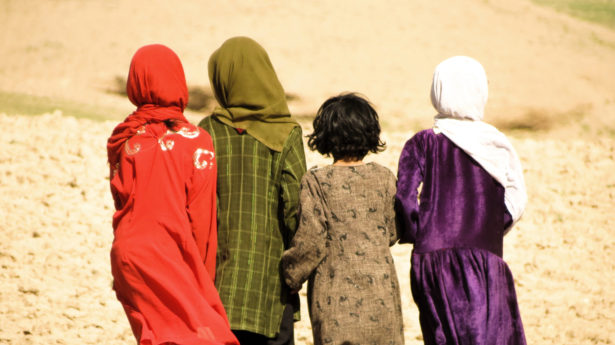The Unitarian Universalist Service Committee advances human rights through grassroots collaborations.
“Many Hands Lighten the Load”

By UUSC Staff on July 15, 2022
Suppose we asked which of the following people would qualify as a “refugee” under international law: someone fleeing a war (like the one currently unfolding in Ukraine)? Someone displaced by a natural disaster, such as a hurricane or an earthquake? How about someone who has to evacuate their home because of the more slow-building effects of climate change, such as soil erosion, crop failure, or rising seas?
The answer might surprise you: none would qualify. Current international law defines a refugee as someone fleeing persecution based on a specific aspect of their identity or views. This definition—written into the core international treaties that founded global refugee law—has proved a crucial scaffolding on which to build protections for many people. But it reflects the specific historical and political context from which it emerged, and it is clearly too narrow to encompass all of today’s realities. People displaced by war and environmental disasters are central to our contemporary meaning of the word “refugee” in everyday speech. Yet the legal definition has not caught up to the full spectrum of reasons why people are forced to leave their homes.
On Monday, June 20, UUSC hosted a webinar with experts from around the world who are seeking to broaden our understanding of who counts as a “refugee”—and of what we mean when we talk about forced displacement. Panelists representing UUSC partners and allies from four different countries—Haiti, Mexico, Burma, and Hungary—discussed the experiences of people forced into a state of migration for a wide variety of reasons: climate-fueled disasters, violence and disorder sparked by organized crime and political injustice, conflict and authoritarian repression. Each of these situations is distinct, yet our partners also highlighted the intersectionality of these various causes of forced displacement.
Panelist Guerline M. Jozef, Executive Director of the Haitian Bridge Alliance, for instance, highlighted the fact that many people from Haiti have been displaced by overlapping forces. This includes the current political crisis in Haiti—a present-day problem with deep roots in the history of ongoing U.S. interference and centuries of colonial exploitation—but also multiple severe storms that have struck the Caribbean in recent years, which cannot be separated out from the effects of climate change. Jozef urged those of us participating in the global conversation about climate displacement to do a better job of centering the experience of impacted people in the Caribbean: “in Haiti every single year some part of the country gets destroyed entirely from climate change,” she said. “We see people from the North, from the South—everywhere—dealing with the fact that climate change is happening.”
Apart from the specific causes of displacement, moreover, panelists emphasized that people in mobility face a common threat in the form of rising nationalism, xenophobia, racism, and authoritarianism. As UUSC’s Senior Partnership Officer for International Justice and Accountability, Myra Dahgaypaw, put it: “It is a human right to seek safety, but those who seek safety outside their homes are often criminalized and subject to xenophobic attacks in receiving countries, thereby creating another unsafe environment.” Panelist Alberto Argüelles, of Asylum Access Mexico, described how this process has unfolded at the Mexican and U.S. borders, subjecting asylum-seekers arriving from the south to detention, criminalization, and militarization of the border landscape.
Dr. Zsolt Szekeres of the Hungarian Helsinki Committee described how this process has unfolded in Hungary, where the Prime Minister has invented the concept of “illiberal democracy” in order to disguise the fact that “the regime he has build up in the past 12 years—that systematically denounced the importance of checks and balances and separation of powers and is derailing the rule of law and democracy—is in fact […] backsliding toward authoritarianism[.]” Dr. Szekeres noted that, in Hungary as elsewhere, this process began with the evisceration of the rights of asylum-seekers during a 2015 migration episode that is still described today as a “refugee crisis,” but which Dr. Szekeres urged us to regard instead as a “rule of law crisis.”
Guerline Jozef emphasized that this shared threat to refugee rights around the world must be met with a stronger bond of solidarity between displaced people. Citing a Haitian proverb, she said:
“‘Many hands lighten the load’ [….] People in mobility—no matter where we find ourselves—when we put ourselves together, we are stronger, and we are able to force and create the changes that are needed in order for us to not only survive, but to thrive.”
Other panelists also spoke of the need for solidarity, adding that it must be accompanied by a dedicated commitment to seeking justice and accountability for the reasons people are forced to flee their homes in the first place. It is not enough to welcome refugees with dignity, emphasized Salai Sa Uk Ling of the Chin Human Rights Organization in Burma. It is also vital that we address the root causes that have made people refugees to begin with, so that even more people are not made to follow them.
In Burma (which the military regime calls “Myanmar”), these root causes take the form of the repressive junta that currently controls the government—after overthrowing the country’s elected leaders in a coup d’état—and is waging war against its own citizens.
“Unfortunately we’re feeling that the focus and attention on Burma is fading as the days go by, the suffering only multiplies and the desperate attention and help to Burma [that is needed] is not forthcoming.”
At UUSC and other social justice organizations, we sometimes refer to our work in short-hand as separate issue areas—migration, climate, and international justice and accountability. But our partners’ words on World Refugee Day provide a powerful reminder that these divisions are an artificial matter of convenience. In reality, the struggle across all these areas is one and the same: the struggle to achieve human rights.
Interested in watching the panel discussion? Visit UUSC’s YouTube page to watch the webinar.
Photo Credit: iStock—Stephen Barnes

